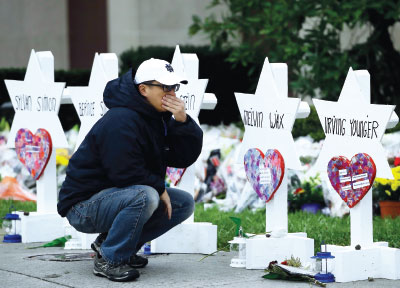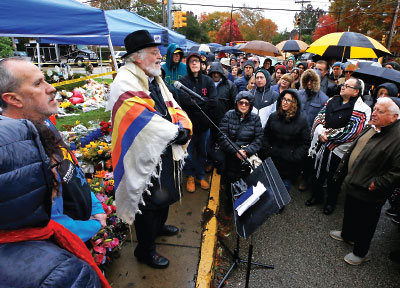Shootings at Pittsburgh Synagogue Raise Anxiety Over More Hate Crimes
Abstract
The Pittsburgh Psychiatric Society is working with local psychiatrists to reach out to those who have been impacted by the October 27 shootings at the Tree of Life synagogue.
Most of the storefronts in the business district of Squirrel Hill, a largely Jewish neighborhood in the east end of Pittsburgh, advertise that the area is “Stronger Than Hate” with a placard featuring the Star of David incorporated into the Pittsburgh Steelers’ iconic three-star logo.

A person pauses in front of Stars of David with the names of those killed in the shooting at the Tree of Life Synagogue in Pittsburgh in October. Area psychiatrists counseled survivors and are assisting in the community’s long-term recovery.
The shootings that left 11 people dead and six injured at the Tree of Life synagogue in Squirrel Hill on October 27 have unified many in the city—including the city’s psychiatrists, who are offering their services to those who have been impacted by the shootings.
The suspect in the shooting, Robert Bowers, faces 44 federal charges in a rampage that left the historic Jewish neighborhood and the rest of the nation stunned. The attack is believed to be the deadliest on the Jewish community in U.S. history, the Anti-Defamation League said in a statement.
At press time, a list of more than 30 psychiatrists, therapists, and licensed social workers from Allegheny Health Network (AHN) who are willing to donate their services to those affected by the shootings has been submitted to the Pittsburgh Psychiatric Society and to the Governor’s Office of Victim Services and its Victims Services Advisory Committee. The list will be distributed to crisis centers locally, according to Pittsburgh Psychiatric Society (PPS) President Amit Chopra, M.D.
“We have provided resources to the current PPS members to help them with general tips on dealing with people who may be affected by this tragedy and are arranging for more formal disaster mental health training for providers at AHN to be better able to deal with those affected by this trauma,” he said.
Chopra, along with Ahmad Hameed, M.D., president of the Pennsylvania Psychiatric Society, issued a press release stating, “Traumatic events affect survivors, emergency workers, and the friends and relatives of victims who have been involved. As psychiatrists, we understand the attack may cause significant distress and pose potential threats to the mental health of all those involved. It is important for everyone to know that help is available, and treatment does work.”

Rabbi Chuck Diamond, a former rabbi at Tree of Life synagogue, leads a Shabbat morning service outside the synagogue where 11 people were killed and six wounded a week earlier during a service.
The release offered tips on how to cope in the aftermath of the shooting, including avoiding overexposure to media coverage of the event and seeking help from a psychiatrist or other mental health professional if overwhelmed with feelings of anxiety or sadness.
Immediately following the shooting, John Rozel, M.D., who is medical director for resolve Crisis Services and an associate professor of psychiatry at the University of Pittsburgh, assisted those impacted by the shooting as part of the Critical Incident Stress Management Team that is run by UPMC Western Psychiatric Hospital. Rozel is also president-elect of the American Association for Emergency Psychiatry.
Team members provided immediate support to survivors of the shooting at the family reunification support center at the Jewish Community Center, which was only a few blocks from the synagogue. Support, according to Rozel, included psychological first aid and critical incident stress management. The team reunited survivors with their loved ones, reviewed self-care plans with them, and ensured that survivors’ basic needs were being addressed in the first hours following the event.
In some cases, he said that it is not uncommon for those impacted by a traumatic event to continue experiencing eating or sleeping problems, tearfulness, and intrusive memories a month afterward. “But this is around the time when we expect people who are going to get better on their own to start showing some improvement.” People who feel that their symptoms are not getting better or are getting worse should reach out for more support, he said.
Pittsburgh-area psychiatrist Ken Thompson, M.D., has been working with survivors of disasters since 1994, when USAir Flight 427 crashed near Pittsburgh International Airport. He also worked with survivors of the 1995 Oklahoma City bombing and the September 11 World Trade Center attack.
The attack on Tree of Life synagogue was different in that the disaster became personal for him, Thompson told Psychiatric News. His dentist, colleague, and friend at the Squirrel Hill Health Center, Richard Gottfried, 65, was among the 11 people killed in the shootings.
“Rich had only a week before placed two crowns in my mouth and was talking about his plans for retirement,” Thompson recalled.
The health center receives federal funds and maintains a refugee program under which refugees receive comprehensive health services. “The guy who committed this horrible act was targeting exactly the kind of patients we treat—and Rich was there with us treating them.”
Thompson noted that these patients, who are grieving Gottfried’s loss, are fearful that they, as immigrants, could also be targeted by a hate crime.
“We have held debriefings and gatherings of mutual support, and are helping the patients work through their fears—when and where will this happen again?”
While he was helping to support health center patients, Thompson noted that his own experience of the shooting “has been visceral, and I’m still not out of the shock or disbelief stage yet.”
Thompson said he will also be working with the Israeli Trauma coalition to help survivors of the shooting. The organization began in 2002 in Israel and now sends professional teams all over the world to train local officials and clinicians to manage trauma and promote rehabilitation after a disaster. A day after the Tree of Life shooting, members of the coalition were on the ground in Pittsburgh, Thompson noted.
The psychiatric response to the trauma caused by the shooting at Tree of Life has just begun. “After an event like this, you have repercussions that continue for a long time,” he said. “Grief is not a solitary event, and it lasts for a while. The impact of the loss doesn’t fully reveal itself, nor does the impact of the violence fully reveal itself, immediately“Unfortunately, we will be dealing with this tragedy for a long time to come.” ■



